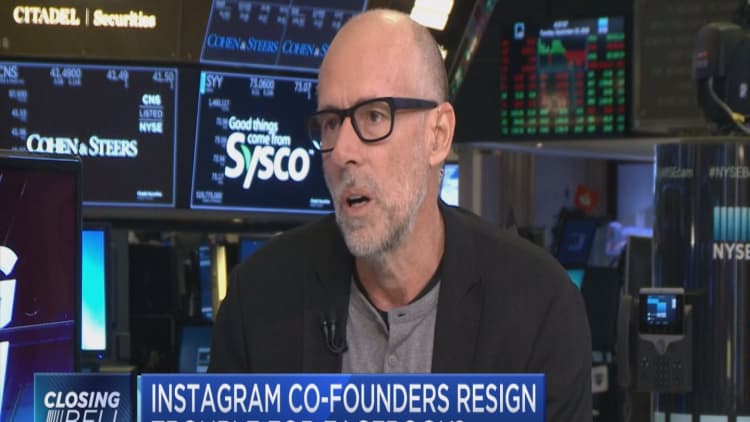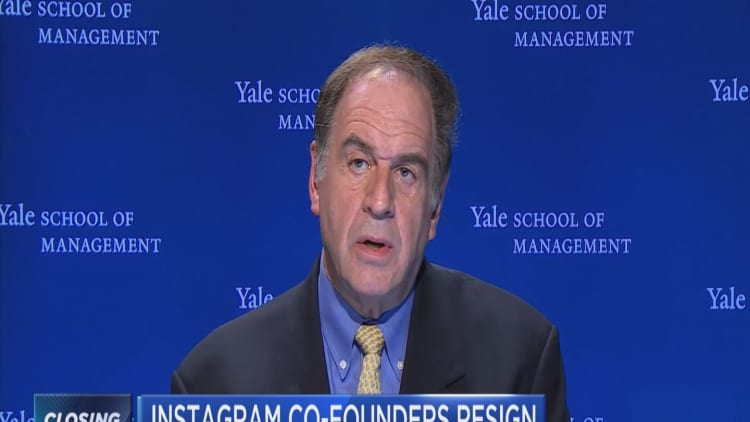Instagram has become a key fixture of Facebook's growth. Facebook bought the photo-sharing start-up for $1 billion in 2012, paying what seemed like a shocking sum of $1 billion for a company with 13 employees at the time.
Now, Instagram has more than 1 billion monthly users, including 500 million daily users of the Stories feature, which was introduced in 2016 to compete against a popular feature of the same name from Snapchat. That growth has resulted in Instagram being valued by analysts at more than $100 billion, or about one-fifth of Facebook's total market cap.
As Facebook's power has grown, so have calls for the company to divest Instagram. Calls to break Facebook up have come from co-founder Chris Hughes and Democratic presidential candidate Elizabeth Warren. The Wall Street Journal in August reported that the FTC is looking at Facebook's acquisitions as part of an antitrust investigation to determine if the company did deals to stifle competition.
Meanwhile, Facebook continues to make strategic acquisitions -- the company paid $19 billion to buy messaging company WhatsApp in 2014, and on Monday the company announced plans to buy CRTL-labs, a start-up working on ways for people to control computers using their minds.

Against this backdrop, it's worth looking back at the Instagram acquisition, which started the company's buying spree. Several former Facebook employees with knowledge of the Instagram acquisition tell CNBC that the company did not purchase the mobile app to squash a would-be competitor. Rather, the former employees argue, Facebook at the time was much smaller and fending off what threatened to be fierce competition from Twitter, which had already bid for Instagram, and Google's new social network. These people asked for anonymity, as they are not authorized to speak to the press about Facebook.
Facebook declined to comment for this article.
Remember Google+?
Even since Twitter launched in 2006, Facebook had viewed it as its main competitor. The San Francisco micro-blogging startup was the only other real name in social at the time, although with a much smaller userbase. By the end of 2011, Facebook boasted 845 million monthly average users according to its S1 filing, while Twitter reportedly claimed over 100 million.
The competitive landscape grew more heated in June 2011 when Google made a full-court push into Facebook's domain with Google+, a new social network that critics initially praised for its innovative features around privacy and control. Google used its other popular services, particularly Gmail, to direct users toward creating and interacting on Google+. By the end of the year, Google claimed 90 million monthly active users for the service, according to executives on an earnings call.
Facebook also had a major internal issue it needed to solve: its strategy for mobile.
Zuckerberg and company had made an early bet on a web-based technology called HTML5, which was supposed to work equally well on different mobile platforms and not require a lot of customization work for each one. But it had become clear that HTML5 apps did not perform as well as apps written specifically for each platform.
In 2011, Facebook's mobile apps ran slow and felt bloated. They were Frankensteins, one former employee told CNBC. The company needed to improve its app and pivot to mobile, where the company projected future growth to be.
To optimize the app and grow on mobile, the company decided to spin out different features and make them their own apps. The most well-known of these spin-offs was Messenger, released in August 2011, which let Facebook users chat with one another.
The company also decided to spin out a photo app and began to work on it in 2011, according to multiple sources.
During the development of this app, Instagram began to capture the attention of Facebook employees. This included Zuckerberg, who asked his employees for their thoughts on Instagram and what its popularity meant for how users would interact with photos on their phones.
Informal chats with start-up founders
Around the same time, as Facebook began gearing up to go public, Zuckerberg networked with fellow entrepreneurs of promising start-ups. Zuckerberg connected with and kept close tabs on Drew Houston of Dropbox, former Facebook co-founder and Asana CEO Dustin Moskovitz and Kevin Systrom, the CEO of Instagram.
Zuckerberg would chat informally with Systrom on the phone to talk about how the companies were doing and any issues Instagram experienced with the Facebook API. Zuckerberg would inform his staffers of the calls, and over six months, he had built a strong relationship with Systrom.
On Friday, April 6, 2012, Twitter made a $500 million acquisition offer for Instagram, and Systrom alerted Zuckerberg to the offer.
On its own, Instagram was not much of a threat, and neither was Twitter. But many Instagram users often exported their photos on the mobile app to their Twitter accounts. Combining the two could've given Twitter a sudden leg up in mobile, where Facebook was still in the midst of a tricky technology shift.
Facebook had been developing its own Camera app in hopes of winning the mobile photo market on its own, but with Twitter making a play for Instagram, Zuckerberg was forced to act fast.
Zuckerberg invited Systrom to his home in Menlo Park, California, near Facebook's headquarters. There, the two worked out a deal for Facebook to acquire Instagram, multiple sources told CNBC. Zuckerberg offered $1 billion for the startup, and the two shook hands. At the time, it was a stunning valuation for a company with only 13 employees, which had just closed a funding round with a valuation of $500 million days before.
Zuckerberg then had Amin Zoufonoun, Facebook's head of corporate development, come to his house, and the two put together every document they would need to finalize the deal. The pair completed a process that normally takes several weeks over the course of one weekend.

News of the deal caught Facebook employees by surprise when it was announced on Monday, April 9. Facebook had made a few small acquisitions here and there, but this was the company's first major deal.
Among those shocked by the news was Dirk Stoop, who was the product manager in charge of Facebook's Photos products and leading development of the Camera app. Stoop found out about the Instagram acquisition that Monday when his wife told him the news while he was in the shower, according to a colleague he told.
Facebook went public a little more than a month later, and a few days after the IPO, the company released the Camera app it had worked on for months. Camera was a neat app, but with Instagram now on its side, Facebook simply did not need it.
Zuckerberg's ace in the hole
The Instagram acquisition was all about combating rivals Twitter and Google+ and boosting its strategy on mobile, the sources said.
If Facebook was able to pivot and become successful on mobile devices, that'd be great, but if not, Zuckerberg at least wanted another horse in that race, one of the sources said. And that was Instagram.
Since then, Facebook's Instagram acquisition has been a stellar success -- so much so that many within Facebook started to feel that the photo-sharing app siphoned growth away from the core Facebook app, according to reports from Wired and The Information.
When Zuckerberg spoke with analysts on the Facebook earnings call in July 2018, he took credit for Instagram's accomplishment of amassing 1 billion users, saying "We believe Instagram has been able to use Facebook's infrastructure to grow more than twice as quickly as it would have on its own."
After the call, Zuckerberg reportedly told Systrom he would be removing the various ways the core Facebook app funneled growth to Instagram, prompting Systrom to send out a memo to employees informing them of the changes, which he disagreed with.
Two months later on Sept. 24, 2018 -- one year ago today -- Systrom and Krieger resigned.



